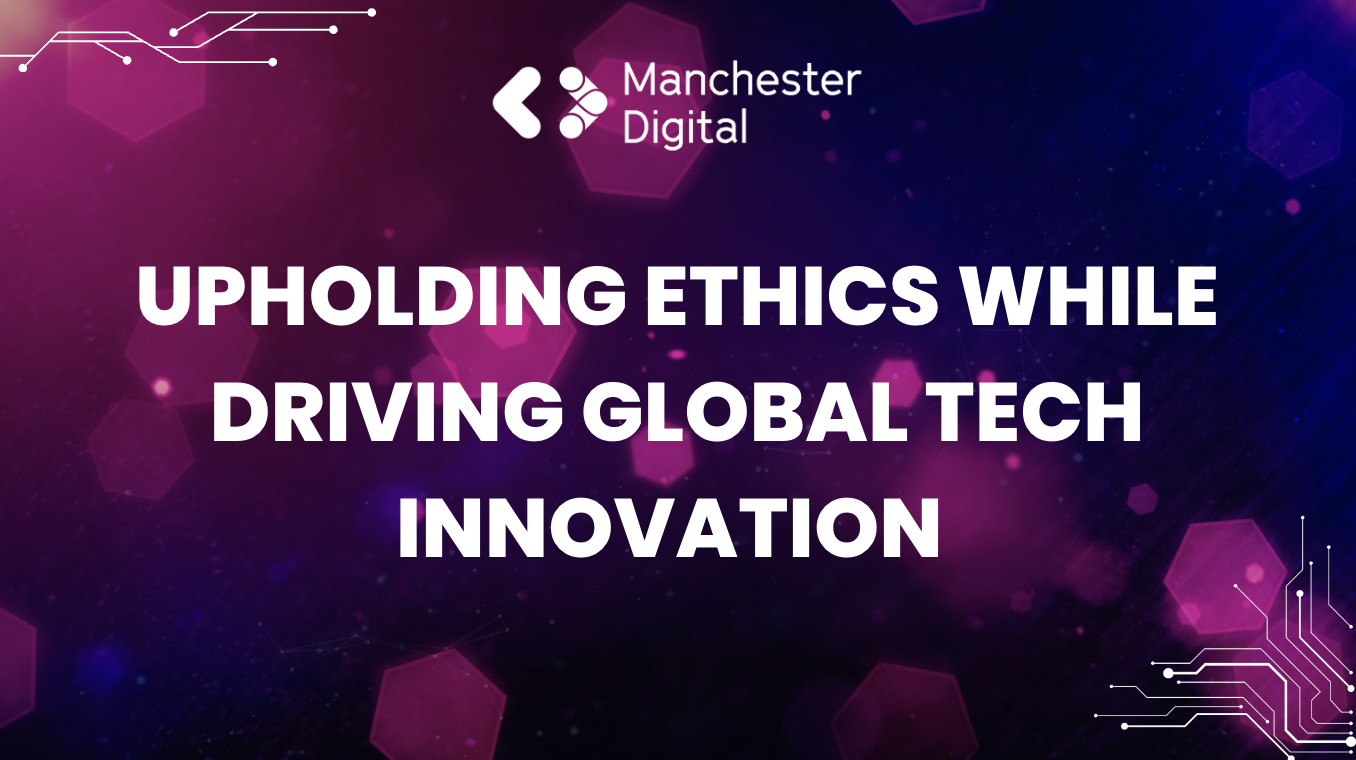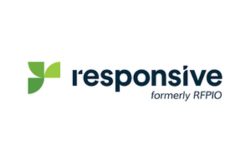
Manchester Digital's Member Conference 2024 is set to explore Tech's Ethical Future.
We asked our members to share their views on "How can we uphold ethics while also continuing to innovate and remain competitive in the global tech landscape?".
Platform
Ethics in digital technology are essential for ensuring privacy, data security, and preventing misuse, thereby safeguarding individuals' rights. Establishing good ethics in digital tech cultivates trust and credibility between technology vendors and users, crucial for widespread adoption.
Ethical guidelines mitigate potential harm from technology misuse or unintended consequences, ensuring the well-being of both individuals and society. They also foster equity and fairness, making digital technologies accessible and beneficial to all, thereby combating discrimination and bias. Overall, ethical considerations are pivotal for responsible and sustainable technological advancement.
Upholding ethics in digital tech innovation is not only a moral imperative but also a strategic advantage. By fostering a reputation for ethical practices, organisations can attract top talent, retain a loyal customer base, and distinguish themselves in a competitive market. Ethics and innovation are not mutually exclusive; rather, they reinforce each other to propel sustainable growth and positive impact in the global tech landscape.
To maintain ethical standards while remaining innovative and competitive, organisations need to prioritise transparency. Companies must openly communicate their practices, products, and data usage to build trust with customers, stakeholders, and the public, thereby cultivating a positive reputation conducive to long-term success.
Protecting personal data is a paramount consideration. Users seek assurance that their personal data is secure, highlighting the importance of developing technology that engenders trust. Reliability is equally critical, as users require technology they can rely on to perform effectively. Trustworthy tech is often reliable, ensuring a positive user experience and fostering trust.
Incorporating ethical design principles into the development process is also vital. These principles ensure that products and services prioritise user well-being, emphasising safety, privacy, and inclusivity.
Aligning innovation with ethical considerations enables organisations to create solutions that benefit society as a whole. Company policies and guidelines should establish clear boundaries and standards for ethical behaviour within the organisation, including training employees on ethical decision-making, fostering a culture of accountability, and providing channels for reporting unethical conduct.
Collaboration with regulators, industry peers, and advocacy groups is also indispensable. By engaging in constructive dialogue and soliciting feedback from diverse stakeholders, tech companies can proactively address ethical concerns and anticipate potential issues.
Find out more about Platform here
Naimuri
Data is everywhere and technology is advancing at a rapid pace. These advancements in technology produce a plethora of questions surrounding how to navigate this ever-changing landscape whilst maintaining ethical practice.
- Government
The first point of call to ensure that we remain ethical whilst advancing in technology, is to look at the Department for Science, Innovation and Technology, and the Data Ethics Framework on GOV.UK. Here, there are guidelines, regulations, and policy papers, as well as government papers which outline how to use data appropriately and responsibly.
- The Key Principles
Defining a set of core principles for data ethics provides a guide to abide by. Many institutions and companies have defined such frameworks, which typically encompass five key ideas:
- Transparency of data use
- Privacy (and consent) of data
- Fairness
- Accountability
- Intention
These principles are mostly self explanatory, and none of them should inhibit innovation or technological progress.
- Open Communication
Open communication within a business is imperative, so that people feel empowered to discuss ethical dilemmas. It is good practice to engage in ethical discussions surrounding innovation in technology, even if the topic is not within your scope. Is AI art enhancing creativity, or taking work from independent artists? Is music technology increasing diversity in music, or depreciating the value of learning a musical instrument? Does it matter? Having these discussions makes people think about questions that don’t have clear right or wrong answers, and sharing opinions opens up the floor for people to share their perspective.
There are methods to ensure that we operate ethically whilst advancing technologically. Government frameworks and principles of data ethics provide a roadmap of how to remain ethical through innovation; and open communication with our peers allows us to fill in the gaps and help guide one another. Technological innovation should be led by ethics, rather than ethics seen as a hindrance to innovation.
Find out more about Naimuri here
KUB
Upholding Ethics While Innovating in the Global Tech Landscape
In the rapidly evolving world of technology, businesses face the dual challenge of maintaining ethical standards while continuing to innovate and stay competitive. At our company, which provides fractional Chief Marketing Officer (CMO) services to businesses worldwide, we believe that ethical practices and innovation are not mutually exclusive but rather complementary pillars that support long-term success.
Commitment to Transparency
Transparency is the cornerstone of ethical business practices. Maintaining open communication with our clients and stakeholders ensures that our operations are understood and appreciated. This involves transparent reporting, honest marketing practices, and a commitment to delivering what we promise. Transparency builds trust, a vital component in establishing long-lasting business relationships.
Responsible Innovation
Innovation should always consider the broader impact on society and the environment. As we develop new strategies and solutions, we prioritize those that promote sustainability and social good. This means investing in technologies that reduce carbon footprints, supporting initiatives that enhance community well-being, and ensuring our innovations do not inadvertently harm or exploit vulnerable populations.
Data Privacy and Security
Data is a valuable asset in the tech-driven marketplace. However, any data collected must be handled with utmost care and responsibility. We adhere to stringent data privacy laws and implement robust security measures to protect our clients' and customers' information. By prioritizing data security, we uphold ethical standards while fostering a culture of trust and reliability.
Continuous Ethical Training
It is essential to keep our team updated on the latest ethical standards and practices. Regular training sessions on ethical dilemmas, industry regulations, and best practices ensure our employees are well-equipped to make decisions that align with our ethical commitments.
Collaboration and Community Engagement
We believe in the power of collaboration and community engagement. Partnering with other ethical businesses and participating in industry forums allows us to share knowledge collectively and set higher standards.
In conclusion, we uphold ethics while innovating is possible and beneficial for long-term success. By being transparent, prioritizing responsible innovation, ensuring data privacy, providing continuous ethical training, and engaging with the community, we can remain competitive in the global tech landscape while staying true to our core values.
Find out more about KUB here
Dark Horse
Upholding ethics is about doing the right thing. This should be the first consideration for all businesses. Dark Horse believes in doing the right thing and because of this, its core value is integrity. With innovation, your actions need to focus on doing the right thing. Making sure that your innovation will help you and your client-base; not delivering vanity metrics and trendlines, but bottom lines and revenue. To achieve this Dark Horse reinvests its profits into making its service better. As a business, we are always looking to improve by testing new theories, this continuous improvement brings innovation. This also costs money. Dark Horse believes in keeping margins low not pricing out clients. No overcharging for services - doing the right thing.
Innovation also impacts the environment through testing and development work. Dark Horse, a digital marketing agency taking customers from 7 to 8 figures, produces high amounts of carbon. As a result, it has created The Dark Forest to offset this carbon. Dark Horse wants to grow it to be 100,000 trees with a combined area bigger than Manchester Airport. The more development done, the more trees planted for offsetting and upholding an ethical stance.
Remaining competitive in the global tech landscape is supported by having integrity. It gives Dark Horse its competitive advantage. Doing the right thing in every aspect of business and building a culture of ethical decision-making. This value (integrity) means Dark Horse works with clients who believe the same, as this message resonates with the target audience. This makes ethical considerations simpler when both you and the client want to do what is right, fostering an environment with open communication, fairness and inclusivity.
The key is to not let your integrity slip for the sake of short-term successes, as longer-term you will suffer.
Find out more about Dark Horse here
6point6
The global tech landscape is rapidly evolving and in the race to innovate, we must remember that treading new ground means dealing with unknown risks. Balancing ethics with innovation is crucial as organisations continue to embed artificial intelligence and machine learning in their operations. We must all integrate ethical considerations into our strategies without hindering innovation, ensuring sustainable growth and competition.
A robust framework governing ethics akin to the Sustainable Web Manifesto should be the foundation of all our work. It is important to emphasise the embedding of ethics at every stage of innovation by implementing the Ethics by Design process, to ensure technologies address societal needs responsibly and avoid potential harm.
Transparency and accountability are also key to success. Embedding ethics into innovation is the key to maintaining a competitive advantage. Organisations are already assessing their suppliers based on sustainability, and ESG credentials are becoming a key part of attracting and retaining talent. As organisations are scrutinised for their values and ethics, a robust framework becomes a competitive advantage.
AI is a key driver of innovation and competition but presents unique ethical challenges so it's crucial to understand its limitations. Despite their capabilities, AI systems are sophisticated tools, not sentient beings – an essential distinction for managing the ethical implications of AI deployment.
The ethical use of AI involves addressing biases in AI training data and ensuring AI decisions are fair and transparent. Engineers must grapple with programming AI to make ethical decisions, acknowledging that AI is neither ‘good’ nor ‘bad’ – it is the product of the data it has been trained on and its programming. Ethics vary between cultures, further complicating the problem and underscoring the need for a diverse and inclusive approach to AI development.
Upholding ethics while fostering innovation involves embedding ethical principles into core strategies, maintaining transparency, understanding AI's capabilities and limitations, and addressing biases in AI systems. This balanced approach ensures that technological advancements contribute positively to society, enhancing trust and competitiveness in the global tech landscape.
Find out more about 6point6 here









